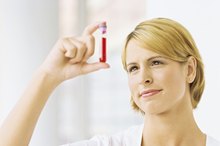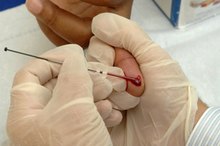Does Echinacea Thin Your Blood?
Your body responds to injury by controlling the thickness and thinness of your blood. Thickening your blood to form clots prevents severe bleeding after injury, but abnormal blood thickness can cause spontaneous clot formation, causing heart attack or stroke. A number of compounds help prevent clot formation by acting as blood thinners. Taking echinacea might have an effect on the thickness or thinness of your blood, though more research is required to better understand its role in blood clot formation.
Blood Thinning and Clotting
Your blood thickness is controlled by two major categories of compounds: pro-coagulants, which thicken your blood, and anti-coagulants, which inhibit the function of pro-coagulants and thin your blood. These compounds affect the activity of specialized cells called platelets, which have the ability to aggregate and form a blood clot or scab, initiating the healing process after injury. A number of nutrients and dietary supplements can affect the function of pro- and anti-coagulant compounds, affecting the platelets' ability to aggregate and form blood clots, and ultimately affecting the thickness and thinness of your blood.
Echinacea and Platelet Health
What Are the Causes of Low Platelets & Low White Blood Cells?
Learn More
Echinacea can have an effect on the thinness of your blood by affecting the health of your platelet cells. A study published in the 2010 "International Journal of Biological Macromolecules" found that echinacea helped protect your platelet cells from oxidative damage -- damage that can prevent proper platelet function. As a result, taking echinacea might help to prevent bleeding or clotting disorders that occur due to platelet damage, so the supplement might help your platelets respond properly to injury.
Echinacea and Blood Thinning Medications
Echinacea also affects your blood by interacting with blood-thinning medications -- pharmaceuticals designed to prevent uncontrolled blood clot formation. A study published in the "British Journal of Clinical Pharmacology" in 2010 found that echinacea affects the metabolism of warfarin, a commonly-prescribed blood thinner. The supplement increases the rate at which warfarin is cleared from your body, and therefore reduces the levels of the drug within your bloodstream. Treatment with echinacea did not appear to inhibit the function of the drug, or alter blood clot formation in healthy adult males.
Considerations
Is a High Dosage of Ginkgo Biloba Safe?
Learn More
The effect of echinacea on platelet function and blood thickness is not yet fully understood. While a preliminary study indicates that echinacea does not interfere with warfarin function in healthy individuals, as of October 2011, the interaction between echinacea and blood thinners has not yet been investigated in people who suffer from clotting disorders. As a result, taking echinacea might still have an adverse effect on individuals who suffer from platelet-related disorders, and the supplement might interact with some blood-thinning medications. Notify your doctor of any supplement use before you take any medication, and consult your physician before you take echinacea, especially if you have a personal or family history of blood disorders.
Related Articles
References
- University of Maryland Medical Center: Echinacea
- International Journal of Biological Macromolecules: The Effect Of Polyphenolic-Polysaccharide Conjugates From Selected Medicinal Plants Of Asteraceae Family On The Peroxynitrite-Induced Changes In Blood Platelet Proteins.
- British Journal of Clinical Pharmacology: Pharmacokinetic And Pharmacodynamic Interactions Of Echinacea And Policosanol With Warfarin In Healthy Subjects.
Writer Bio
Sylvie Tremblay holds a Master of Science in molecular and cellular biology and has years of experience as a cancer researcher and neuroscientist. Based in Ontario, Canada, Tremblay is an experienced journalist and blogger specializing in nutrition, fitness, lifestyle, health and biotechnology, as well as real estate, agriculture and clean tech.








